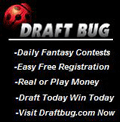RotoGuru Menu
![]() Daily blurbs
Daily blurbs
![]() Message Forum
Message Forum
![]() Forum Keepers
Forum Keepers
![]() Sponsorship
Sponsorship
![]() Troubleshooting
Troubleshooting
Football Pickoff
![]() Login
Login
![]() Standings
Standings
Football
![]() NFL Schedule
NFL Schedule
![]() Field Goals
Field Goals
![]() Player Lookup
Player Lookup
TSN Football
![]() Sortable TSN Stats
Sortable TSN Stats
![]() Weekly TSNP
Weekly TSNP
![]() Team Rankings
Team Rankings
![]() Assimilator
Assimilator
RotoHog Football
![]() Sortable RotoHog Stats
Sortable RotoHog Stats
![]() Weekly RHP
Weekly RHP
 |
Basketball
![]() Hoop Pointers
Hoop Pointers
![]() Player Lookup
Player Lookup
NBA Schedule
![]() Full Season
Full Season
![]() Next 4 weeks
Next 4 weeks
![]() Sched-O-Matic
Sched-O-Matic
TSN Hoops
![]() TSN Stats
TSN Stats
![]() Yesterday's TSNP
Yesterday's TSNP
![]() Team Rankings
Team Rankings
![]() Assimilator
Assimilator
NBASE
![]() NBASE Stats
NBASE Stats
![]() Yesterday's RHP
Yesterday's RHP
Market Madness
![]() Contest Site
Contest Site
![]() Rules
Rules
![]() Historical Stats
Historical Stats
![]() Recap of Entries
Recap of Entries
![]() Unit Returns
Unit Returns
![]() Standings
Standings
 |
Baseball
![]() MLB Schedule
MLB Schedule
![]() Base Advances
Base Advances
![]() Player Lookup
Player Lookup
TSN Baseball
![]() Sortable Stats
Sortable Stats
![]() Yesterday's TSNP
Yesterday's TSNP
![]() Team Rankings
Team Rankings
![]() Assimilator
Assimilator
RotoHog Baseball
![]() Sortable Stats
Sortable Stats
![]() Yesterday's RHP
Yesterday's RHP

Draft Bug Baseball
![]() Sortable Stats
Sortable Stats
![]() Yesterday's DBP
Yesterday's DBP
General
![[RotoGuru logo]](http://rotoguru2.com/images/gfs2.gif)
Fantasy Strategy Ideas from the Guru
Teeing it up
I'm a firm believer in the maxim that the only way to really understand how to do something is to screw it up first. Since no one has had a chance to play this year's game yet, we can't know for sure how the new rules will operate, and what the best strategies might be. But that shouldn't stop us (and certainly won't stop me) from spewing out my preseason thoughts.
First, a general perspective on football vs. other fantasy sports. Football is somewhat unique in that there are only 16 games during a season. Basketball and hockey have 82, and baseball almost double that number. This has some very significant ramifications on strategy:
- Every game is much more important in football. You can't expect to succeed if you "waste" a game with an unproductive roster slot. Pay very careful attention to injuries (RotoNews is usually a good up-to-date source), bye weeks, demotions, etc.
- Statistical averages never have much chance to converge. While they accurately portray what has happened, you have to view their predictive capabilities with a very skeptical eye.
- Luck can play a significant role. One or two well placed breakout games can make a big difference. That's part of the fun, but also part of the frustration. Recognize that being the best student of the game isn't necessarily going to win out. Over time, it probably would. But time is one luxury you don't have much of.
Now on to some of the specifics of this year's Smallworld game.
In recent Smallworld games, I believe that the optimal strategy has been to focus on generating value gains in the first 20-40% of the season, building your roster value to a level that permits you to own a "dream team" for the remainder of the season. I don't think that same rationale applies here. The rationing of trades and the $1 million cap on weekly price changes will limit the ability to amass a quick fortune. Finding productive talent in the mid-priced range is going to be critical.
The weekly limit of four trades will also place greater importance on your draft.. With an eleven-slot roster, you're going to have to live with at least seven of your draftees for at least two games, and three for at least three weeks. So your draft may be more critical than was the case in other games. At least you'll still have 18 trades (or more) left for the second half!
A peculiarity of the football schedule is the bye week. During weeks 3-9, each NFL team has one bye. Because the season is relatively short - 16 games - it is not a good idea to have a player on your roster who will not be playing. Since byes occur relatively early in the season, and since trades are limited, bye-week management will be very important. Remember that if you plan to drop a player before his bye, and then pick him up again, that consumes 2 trades. Because of this, I question the wisdom of drafting a player from one of the four teams - Atlanta, Carolina, New Orleans, and San Francisco - which have their bye on week #3. Does it make sense to draft a player that you know will have to be traded after two weeks? Of course, once a team gets past its bye, its players become somewhat more valuable thereafter.
Adding a team defense slot to the roster is a new feature this year, and this is more interesting because it is solely a negative scoring category. Team defense may be one of those roster slots that you want to manage more actively, since it may depend heavily on who the next opponent is. As a roster category with only 30 choices, price changes may be more volatile in this category, especially if defenses are actively traded by a lot of managers. Watch the activity in the early weeks to gauge how this slot is going to behave.
Bye week management for the "Team Defense" slot raises an interesting consideration. If you hold a defense that has a bye, you'll be charged -325 SWP for that week, which Smallworld reports to be the average weekly value for a team defense based on 1997 stats. However, when I calculate the values for last season, I arrive at an average weekly value of -415 SWP, with only three teams averaging better than -325. Assuming my values are correct (and I encourage you to check them yourself), it may make sense to own most team defenses for a bye week, since -325 will probably be a good weekly score. In fact, you might want to trade for a bye defense! Food for thought.
There are no wild card slots this year, so every roster category is self contained. Thus, every time one quarterback is bought, another quarterback is sold. This has been noticeable in baseball from time to time, especially in the catcher and middle infield positions. So it will help you to think not only about who is likely to bought or sold, but also who is likely to be on the flip side of those trades.
These are some of my early, scattered thoughts. One of the nice benefits of fantasy football is that there is more time to think and react than in other sports. With only one game per week, you have a lot of time to study, plan, and execute your next moves. I, for one, appreciate the slower pace, since the first part of the season overlaps with baseball, and the second half overlaps with the start of the winter sports.
As always, I encourage you to send me your ideas on strategy. I hope to have an active feedback page for the next few weeks.
Are you ready for some football?
RotoGuru is produced by Dave Hall (a.k.a. the Guru), an avid fantasy sports player. He is not employed by any of the fantasy sports games discussed within this site, and all opinions expressed are solely his own. Questions or comments are welcome, and should be emailed to
Guru<davehall@rotoguru2.com>.© Copyright 1998-2008 by Uncommon Cents, LLC. All rights reserved.
